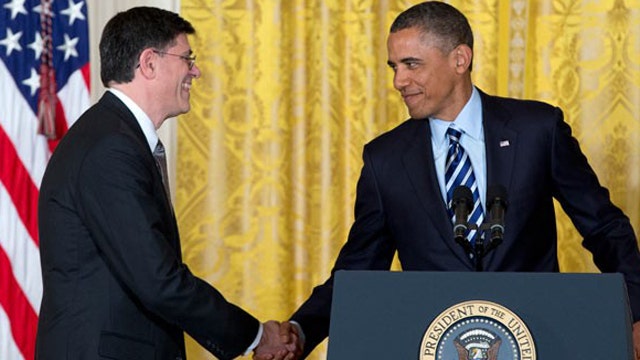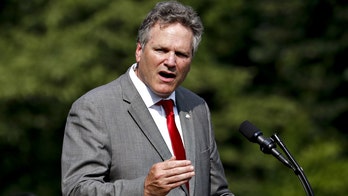Power Play 2/11/2013
Obama, Lew and the Cayman tax trap. Plus: Rubio and Obama to call for stimulus spending
“Is someone who has sheltered their income taxes in Switzerland, the Caymans and Bermuda really someone who’s going to get under the hood and get us to a place of tax fairness?”
-- Robert Gibbs, senior adviser to President Obama’s re-election campaign, on “Morning Joe” on July 9.
Ginning up interest in President Obama’s fourth State of the Union address is proving a bit difficult.
We are told that Obama will call for the same thing in this speech as he has called for in most of his remarks on domestic policy since taking office in 2009: increased government spending financed through higher taxes on top earners.
The drama, according to Obama Democrats, is that the president will be bold and audacious in his calls, demanding that Republicans go along with his plans in the name of job creation.
But at a certain point, audacity becomes anodyne. A teenager’s first tattoo may shock her parents. Her fifth one will be greeted with no more shock than a forecast for an overcast day in February.
There is something mildly amusing about Obama making yet another “pivot” to joblessness, a maneuver he has been attempting since the days when the battle over his 2010 health law immolated most of the rest of his first-term agenda.
As the president calls for more spending, or as he calls it, “investments” in government programs and subsidies he says will produce a “sustainable” economy he will no doubt bow to the realities of public finance and public opinion.
Obama is keeping liberal hearts fluttering by his howitzer attacks on Republican redoubts on debt, deficits and spending. But the president knows that his claims and those of his lieutenants about the need to reduce deficits by increasing them are way, way out of step with public opinion.
(House Minority Leader Nancy Pelosi won the prize for thinnest hair split when she told FOX News colleague Chris Wallace that the government didn’t have a spending problem but a “budget deficit problem.” Got it.)
Obama will speak, no doubt, of the reductions to future increases in spending he allowed in his first-term budget battles with Republicans. He will almost certainly speak of something like “common sense” reforms that can be made to reduce the deficit spending associated with entitlement programs. And he will surely talk about how deficit spending today is the key to reduced deficit spending in the future.
But the keystone in his proposal will be another round of tax increases for top earners.
In the battle over the so-called “fiscal cliff” tax hikes at the end of last year, Obama spurned Republican calls for a tax reform package that would have closed loopholes for upper-income households. Obama insisted on, and won, a rate increase.
The money raised was a relative pittance, the proceeds from this year’s higher rates being only about enough to cover the cost of an aid package for Hurricane Sandy victims. But the president was trying to make an ideological point about the moral need for higher tax rates in the name of alleviating income inequality.
[pullquote]
But as Republicans pointed out, whether the government takes more from top earners in the form of rate hikes or capping deductions, the dollars are all coming from the same place. Call it a tax, a fee, a simplification or anything you want, it’s all money out of somebody’s paycheck.
Obama, though, is now ready to take Republicans up on their original offer to close loopholes. This is being greeted on the right with the same befuddlement that a person who just bought a new car would have if the salesman called up to start talking about the price of the undercoating package.
With the sword of “middle-class jobs held high, though, Obama believes he can pressure Republicans into allowing taxes to rise again, or at least do more damage to the party’s reputation: “millionaires and billionaires…”
But having been helped by the “new normal” of America’s lowered economic expectations in the campaign, Obama may be hard pressed to rouse public sentiment on the subject. He is heading out on the campaign trail to sell more taxes and spending after the speech, but why would folks get behind a program they don’t think will work to solve a problem they don’t believe can be fixed?
But as Obama talks about the need for “tax reform” he is also setting a trap for what may be his most controversial nominee, Jack Lew, the White House chief of staff whom Obama wants to run the Department of the Treasury.
Lew, it turns out, did what Obama pilloried Republican presidential candidate Mitt Romney for doing and shielded some of his money from the, er, Treasury Department by stashing it in the Cayman Islands.
While it was awkward for outgoing Secretary Timothy Geither to admit that he couldn’t figure out how to use Turbo Tax to pay his taxes, it is something else for Lew to say that he didn’t pay taxes on that money, on purpose.
Romney responded to Obama’s attacks on his Cayman’s cash by saying that the ridiculous U.S. tax code necessitated and encouraged such things, arguing that his offshoring was evidence of the need for a fairer, flatter system. Team Obama said the offshoring was evidence of Romney’s unpatriotic worldview and unfit character. Blamo.
But what will Lew say when asked about the accounts on Wednesday, the day after the president’s speech, about his use of offshore tax havens? Probably something like Romney, saying he followed the law and that the tax code needs to be reformed. But now he will do so with his boss’ argument that tax avoidance shows bad character and unpatriotic sentiment ringing in everyone’s ears.
Obama’s political architect, David Axelrod once claimed that Obama could have stashed cash a la Lew and Romney but chose not to because it was wrong in his way of thinking.
Over to you, Mr. Lew.
Chris Stirewalt is digital politics editor for Fox News, and his POWER PLAY column appears Monday-Friday on FoxNews.com. Catch Chris Live online daily at 11:30amET at http:live.foxnews.com.





